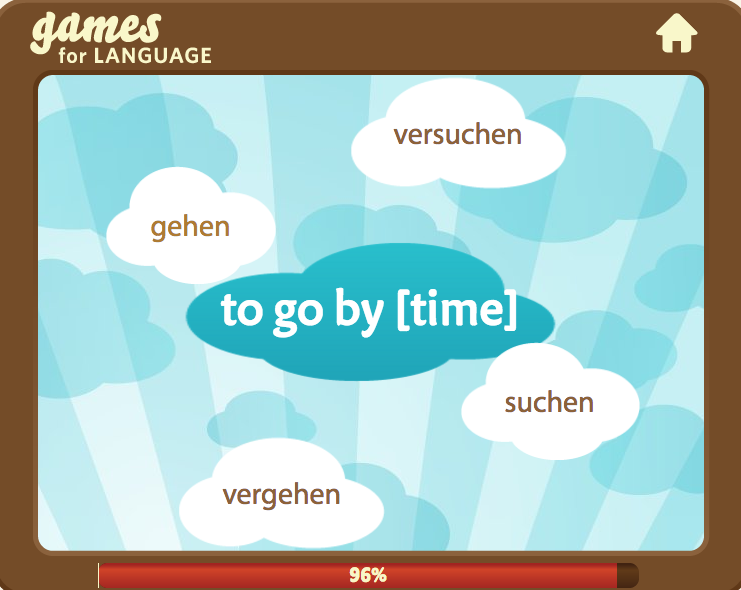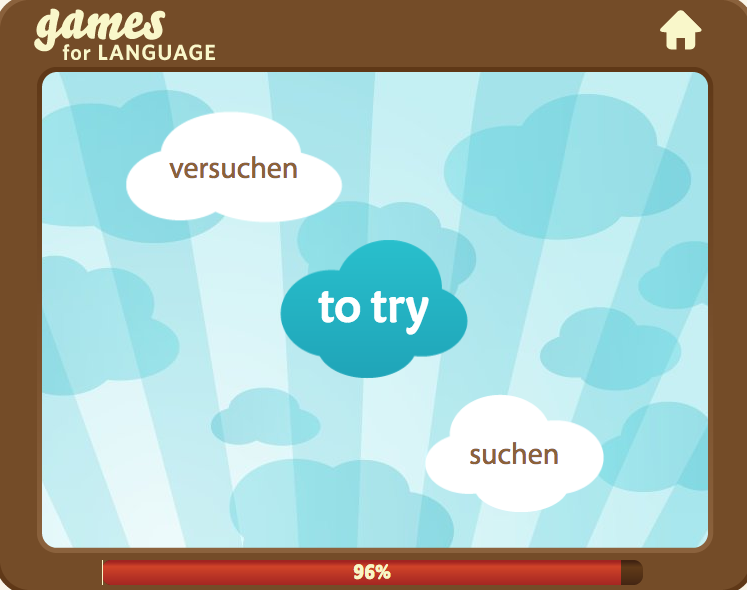German Prefixes #1: The Inseparable Prefix “Ver-”
 Some time ago we added a German Quick Language Game called “2 Verb Pairs with 'ver-'.” Soon after, a few players contacted us with some questions about the Prefix "ver".
Some time ago we added a German Quick Language Game called “2 Verb Pairs with 'ver-'.” Soon after, a few players contacted us with some questions about the Prefix "ver".
No wonder: Among the many German prefixes, “ver-” is a very confusing one. If you agree, you're not alone: in Mark Twain's Notebooks & Journals, Volume II (1877-1883), page 253, the author laments about the many “fragmental elements” of the German language:
"German language is a dozen fragments of words flung into an octagonal cylinder …. up spring your fragmental elements with Ver's & Be's & Ge's & Er's & lein's & schen's & gung's & heit's & zu's & a thousand other flashing & blazing prefixes, affixes & interjections broiderd on them or hung to them."
Well, even if Twain was exaggerating just a bit, the “ver-” prefix can indeed be tricky and somewhat misleading.
Moreover, “ver-” is just one of a number of inseparable prefixes. (Others are “er-”, “ent-” “emp-“, ”be-”, “ge-”, “zer-”.) At least the inseparable prefixes don't add to a learner's word-order woes.
A Little Prefix "ver-" Language History
Today's German inseparable prefix “ver-” can be traced back to the Old High German “far-”, which originates from a mixture of Proto-Germanic “fer-”, “fur-”, “fra-” and other similar particles. And it's no coincidence that you'll recognize the “ver-” also in the “pro-”, “per-”, “pre-”, “for-” of English and other European languages.
In German the inseparable prefix “ver-” appears in four basic ways:
1. As a simple prefix.
2. As a Prefix that makes the root verb a “faulty action,” or somewhat the opposite of what the root verb implies.
3. As a Prefix that makes the root verb an action (often new, different, but somewhat related).
4. There are a number of verbs starting with “ver-”, where the root verb doesn't have a meaning of its own.
Look at the examples below:
1. As a Simple Prefix
 Examples:
Examples:
• geben – (to give) vs vergeben – as in: Ich vergebe dir. (I forgive you.)
• kehren – (to sweep) vs verkehren – as in: Er verkehrt in besten Kreisen. (He socializes with high society.)
• gehen – (to go, walk) vs vergehen – as in: Die Zeit vergeht. (The time goes by.)
[Note however, “sich vergehen” means to abuse someone sexually and “ein Vergehen” is a minor offense.]
In the above examples, the prefix “ver-” creates a new meaning with the root verb. Even if you know the meaning of the core verb, you may find the new meaning with the prefix hard to guess.
Many of the root verbs in this category also take other (inseparable) prefixes, such as “er-”, “be-”, “ent-”, etc.
• ergeben – as in: Ich ergebe mich. (I give up, surrender.)
• bekehren – as in: Er bekehrt die Ungläubigen. (He converts the unbelievers.)
• entgehen – as in : Er entgeht einer Gefahr. (He escapes a danger.)
2. As a Prefix that makes the root verb a “faulty action,” or somewhat the opposite of what the root verb implies.
Examples:
• kaufen – (to buy) vs verkaufen – as in: Ich verkaufe mein Auto. (I am selling my car.)
• zählen – (to count) vs (sich) verzählen – as in: Ich habe mich verzählt. (I miscounted.)
• fahren – (to drive) vs (sich) verfahren – as in: Ich habe mich verfahren. (I got lost driving.)
In these cases, the somewhat opposite meaning can be guessed from the root verb. Here the “ver-” prefix sometimes corresponds to the English “mis-” prefix, as in “miscount” above, to misspell (sich verschreiben), to miscalculate (sich verrechnen), etc.
These root verbs combine only with a few inseparable prefixes. But they do combine with a number of separable prefixes, such as “auf-”. Often these change the root meaning just slightly.
• aufkaufen – as in: Er kaufte halb Las Vegas auf. (He bought up half of Las Vegas.)
• aufzählen – as in: Sie zählte alle seine Fehler auf. (She enumerated all his faults.)
• auffahren – as in: Er fuhr auf das Auto vor ihm auf. (He rear-ended the car in front of him.)
3. As a Prefix that makes the root verb an (often new, different, but somewhat related) action.
This is the most frequent use of “ver-”.
 Examples:
Examples:
• suchen - (to seek, search) vs versuchen – as in: Ich versuche es. (I'm trying it.)
• binden – (to tie, bind) vs verbinden – as in: Ich verbinde Sie. (I'll connect you.)(Note that there is second meaning of • verbinden: to wrap, bandage.)
• folgen – (to follow) vs verfolgen as in: Ich verfolge ihn. (I pursue him.)
With most of these there are many other separable and inseparable prefixes that let you guess the meaning quite easily.
4. There are a number of verbs starting with “ver-”, where the root verb doesn't have a meaning of its own.
Examples:
• verdächtigen – to suspect
• verdeutlichen – to make clear
• vergessen – to forget
There are just a few verbs in this category and the root verbs typically don't work with any of the other separable or inseparable prefixes. So you'll just have to learn their meaning.
While prefixes can be confusing at times, they can also provide you with an initial clue of their meaning – especially when you understand the context in which they are used.
Test Your German with the Prefix "ver-"
Depending on how good your German is, you may have fun guessing the meaning of these “ver-” verbs below. You can look up the translation on Google translate or send us a note and we'll return the answers.
|
Root verb |
English |
“ver-” Prefix Verb |
English |
Category |
|
achten |
to respect |
verachten |
||
|
ändern |
to change |
verändern |
||
|
ärgern |
to annoy |
verärgern |
||
|
arbeiten |
to work |
verarbeiten |
||
|
bauen |
to build |
verbauen |
||
|
bergen |
to recover |
verbergen |
||
|
beugen |
to bend |
verbeugen |
||
|
bieten |
to offer |
verbieten |
||
|
bitten |
to ask |
verbitten |
||
|
brechen |
to break |
verbrechen |
||
|
danken |
to thank |
verdanken |
||
|
decken |
to cover |
verdecken |
||
|
dienen |
to serve |
verdienen |
||
|
drehen |
to turn |
verdrehen |
And often, when you learn and remember the root verb, you'll also have an easier time remembering the many derivatives with the “flashing and blazing prefixes”.
Bio: Ulrike & Peter Rettig are co-founders of Gamesforlanguage.com. They are lifelong language learners, growing up in several European countries before moving to Canada and the United States. You can follow them on Facebook, Twitter, and Instagram.
